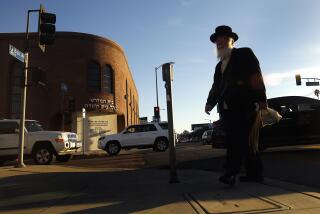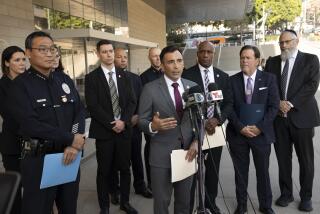Synagogue shooting unnerves city
When the sound of gunfire shattered the peace of morning prayer Thursday at a North Hollywood synagogue, the shock waves traveled fast and far.
Was it a hate crime? An act of terrorism? An isolated incident or part of a wider plot? These were all real fears in a city where, 10 years ago, a white supremacist gunman terrorized a Jewish preschool and murdered a postal carrier, and where police have been on alert for acts of terror since Sept. 11, 2001.
By day’s end, authorities had come to believe that the shooting, in which two men were wounded, was probably a far more mundane crime.
“There is absolutely no evidence to support any connection to terrorism or a hate crime,” said Mike Downing, deputy chief of the LAPD’s Counter Terrorism and Criminal Intelligence Bureau.
The gunman, whose image was captured by video cameras, remained at large, with the investigation being led by North Hollywood detectives, not Downing’s elite anti-terror squad.
For a few hours, though, the shooting in the synagogue garage set nerves on edge throughout the city. Word traveled rapidly from temple-goers to police to city leaders to members of a joint regional terrorism task force.
The Los Angeles Police Department responded in force. Calls and e-mail alerts spun out to temples and Jewish organizations across the city. Reports were relayed by news agencies and television channels nationwide. Mayor Antonio Villaraigosa rushed to the scene, joining two of the three candidates to succeed outgoing Police Chief William J. Bratton.
Then, gradually, investigators began ramping down the tension.
According to police, the shooting occurred at 6:19 a.m., after the victims parked their cars in the underground garage of Adat Yeshurun Valley Sephardic Synagogue, a small congregation on a quiet residential street. Morning services were underway.
A young gunman, dark-skinned and wearing a dark hooded sweat shirt, approached one man near a stairwell and tried to shoot, police said, but his gun jammed.
The second congregant noticed the commotion and approached the gunman, who then shot both men in the legs. The gunman did not speak, according to LAPD Deputy Chief Michel Moore.
The shooter fled, and witnesses called 911.
The victims, Maor Ben-Nissan, 37, and Allen Lasry, believed to be in his 40s, were taken to hospitals, where they were listed in good condition.
Detectives were working with them to understand what happened, Moore said. They do not believe the motive was robbery, according to LAPD sources, who spoke to The Times on the condition they not be named because the investigation is continuing.
Rabbi Amran Gabay described both men as regulars at the temple. He said one works in home improvement and the other in tile sales. The rabbi said he knew of no reason why either would be targeted, adding: “They’re regular people.”
A 17-year-old who was detained for questioning shortly after the shooting was released hours later, and police backed away from initial claims that the attack was motivated by religious hate.
Although the shooter was first described as being black, a police source later said detectives were not certain of the suspect’s race.
“This investigation is wide open,” said Capt. Sharyn Buck, who oversees the LAPD’s North Hollywood Division.
Several law enforcement sources told The Times that investigators were looking at whether the shooting was related to a business or personal dispute. The sources said detectives believe that one of the victims was the target and that the second victim may have been shot because he witnessed the attack.
Speaking to reporters outside the taped-off synagogue, Mayor Antonio Villaraigosa called the incident “a senseless act of violence.” But he was careful to temper concerns that the shooting was a hate crime.
“None of us should presume or speculate more about this other than it was a random act of violence,” he said.
Adat Yeshurun, a congregation of mostly Moroccan and other North African Jews, is in the heart of the San Fernando Valley’s Orthodox community and within walking distance of kosher markets and other synagogues.
Yehuda Oz, 53, has attended the temple for 15 years and arrived early Thursday to begin his regular morning prayers.
About an hour later, as he prayed with some 15 others in the sanctuary, four gunshots broke the silence, he said. He heard screams from the parking lot, then saw two men stumble into the temple.
Their blood spread over the floor as people rushed to stop the bleeding, Oz said, but no one inside saw the shooter.
“Maybe it was crazy person. Maybe he was drugged up. Maybe it was a Jew. We don’t know,” Oz said, nervously adjusting his yarmulke as he stood outside the taped-off scene with two friends.
The temple installed security cameras years ago to discourage attacks, he said.
The shooting prompted the closure of a school next to the synagogue. But about half a mile away at Or Hachaim Academy, also run under the guidance of Rabbi Gabay, classes were in session and the school was observing the anniversary of the death of the biblical matriarch Rachel.
A school official said sixth- and seventh-grade girls recited psalms for the two shooting victims.
“Rachel always prays for her children,” Principal Deborah Raskin said. “We take comfort knowing that this could have been a much worse situation.”
Alejandro Sisro, 13, will almost certainly never forget what happened Thursday. He came to the synagogue in the morning wearing a new suit, his hair combed, his Torah portion memorized, ready for his bar mitzvah, the Jewish rite of passage. On the way in, he hit a snag -- a line of police tape stretching between him and manhood.
For the Sisro family, it meant calling dozens of friends and relatives, some of whom had traveled from as far away as Argentina and Mexico, to alert them that the ceremony would be postponed. Eventually, it was rescheduled for the evening.
The wait was agonizing for Alejandro. “He kept saying, ‘When can we go back? When can we go back?’ ” said his mother, Naomi.
In the end, the bar mitzvah ran smoothly -- the rhythmic prayers, the handshakes, a pinch on the cheek from the rabbi. The family did have to accommodate a few unexpected guests: reporters and photographers who had been sent to cover the shooting.
“It’s not so bad,” Alejandro said. “I’ll get famous because everyone knows I had my bar mitzvah.”
--
Times staff writers Mitchell Landsberg, Anna Gorman, Duke Helfand, Baxter Holmes and Catherine Saillant contributed to this report.
More to Read
Sign up for Essential California
The most important California stories and recommendations in your inbox every morning.
You may occasionally receive promotional content from the Los Angeles Times.











